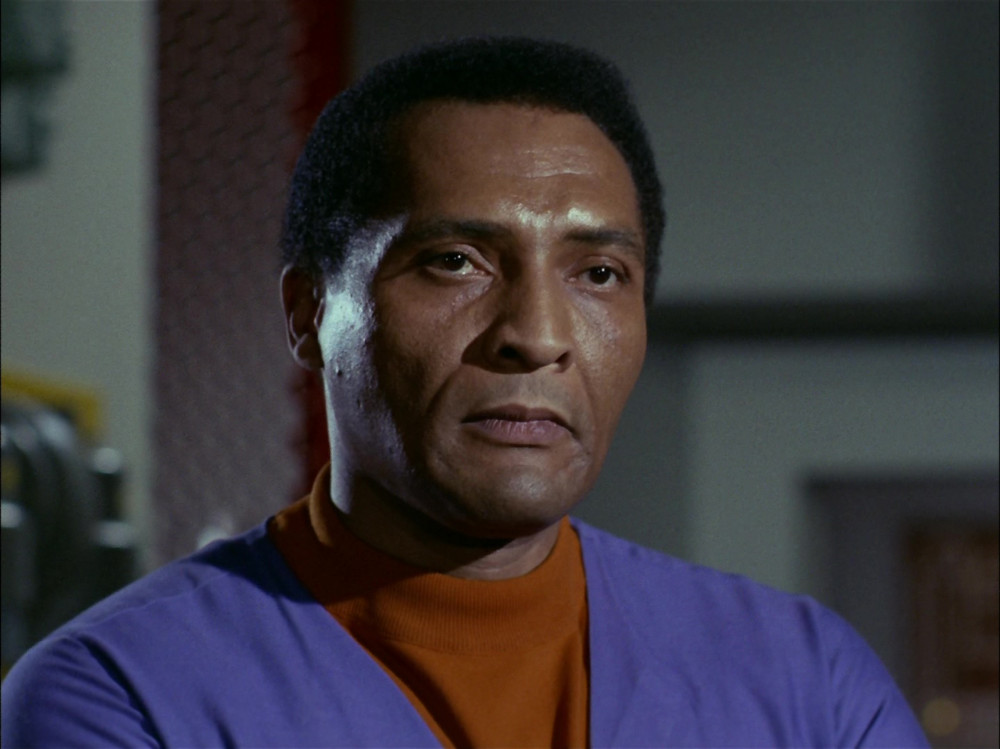Difference between revisions of "Richard Daystrom (FASA)"
From Trekipedia
m |
m |
||
| (6 intermediate revisions by the same user not shown) | |||
| Line 3: | Line 3: | ||
{{TableRow|title=Species|data=[[Humans (FASA)|Human]]}} | {{TableRow|title=Species|data=[[Humans (FASA)|Human]]}} | ||
{{TableRow|title=Sex|data=Male}} | {{TableRow|title=Sex|data=Male}} | ||
| + | {{TableRow|title=Born|data=[[Reference Stardate|RSD]] [[2146 (FASA)#August|1/4608]]}} | ||
{{TableRow|title=Portrayed by|data=[[Marshall, William|William Marshall]]}} | {{TableRow|title=Portrayed by|data=[[Marshall, William|William Marshall]]}} | ||
| − | {{TableRow|title=Advertising|data={{ | + | {{TableRow|title=First Appearance|data=[[Star Trek|TOS]] [[The Ultimate Computer (Episode)|53]] ([[1968 (Production)#MAR08|8 Mar 1968]])}} |
| + | {{TableRow|title=Advertising|data={{AmazonSFC}}}} | ||
|}</div> | |}</div> | ||
{{BannerFASA}} | {{BannerFASA}} | ||
| − | + | [[Doctor]] Richard Daystrom was born on [[Reference Stardate]] [[2146 (FASA)#August|1/4608 (August 2146)]]. A research physicist,<ref name="SFC"/> he was renowned for the invention of [[duotronics (FASA)|duotronics]],<ref name="TOS53"/>—a method of processing information not in the binary method of older computers, but in 10<sup>36</sup> gradations of ''maybe'' between yes and no—which by [[2208 (FASA)|2208]]<ref name="SFC"/> powered the [[computer]] systems aboard [[United Federation of Planets (FASA)|Federation]] [[Starfleet (FASA)|Starfleet]] vessels like the [[U.S.S. Enterprise NCC-1701 (FASA)|U.S.S. ''Enterprise'' NCC-1701]].<ref name="TOS53"/> | |
| + | |||
| + | On Reference Stardate [[2171 (FASA)#September|1/7109 (September 2171)]], Daystrom shared a [[Nobel Prize]] with [[Abramson, William (FASA)|William Abramson]] for their revolutionary work on duotronics.<ref name="FASA2011"/> A year later, on Reference Stardate [[2172 (FASA)#June|1/7206 (June 2172)]], Daystrom and Abramson's work led to the development of the first practical, portable [[universal translator (FASA)|universal translator]].<ref name="FASA2218A"/> | ||
{{References}} | {{References}} | ||
<references> | <references> | ||
| Line 15: | Line 19: | ||
<ref name="FASA2218A">{{RefFASA2218A}}</ref> | <ref name="FASA2218A">{{RefFASA2218A}}</ref> | ||
</references> | </references> | ||
| + | {{DEFAULTSORT:Daystrom, Richard (FASA)}} | ||
[[Category:Library]] | [[Category:Library]] | ||
[[Category:People]] | [[Category:People]] | ||
| + | [[Category:Humanoids]] | ||
[[Category:Humans]] | [[Category:Humans]] | ||
[[Category:Federation Citizens]] | [[Category:Federation Citizens]] | ||
Latest revision as of 06:11, 28 August 2023
Myriad Universes: Richard Daystrom
Richard Daystrom
| Species | Human |
| Sex | Male |
| Born | RSD 1/4608 |
| Portrayed by | William Marshall |
| First Appearance | TOS 53 (8 Mar 1968) |
| Advertising |
Doctor Richard Daystrom was born on Reference Stardate 1/4608 (August 2146). A research physicist,[1] he was renowned for the invention of duotronics,[2]—a method of processing information not in the binary method of older computers, but in 1036 gradations of maybe between yes and no—which by 2208[1] powered the computer systems aboard Federation Starfleet vessels like the U.S.S. Enterprise NCC-1701.[2]
On Reference Stardate 1/7109 (September 2171), Daystrom shared a Nobel Prize with William Abramson for their revolutionary work on duotronics.[3] A year later, on Reference Stardate 1/7206 (June 2172), Daystrom and Abramson's work led to the development of the first practical, portable universal translator.[4]
Notes and References
- ↑ 1.0 1.1 Goldstein, Stan et al (Authors). Spaceflight Chronology. Star Trek. Book. Wallaby Books. 1980.
- ↑ 2.0 2.1 Roddenberry, Gene (Executive Producer). "The Ultimate Computer." Star Trek, Season 2, Episode 24. Directed by John Meredyth Lucas. Story by Laurence N. Wolfe. Teleplay by D.C. Fontana. Desilu Productions, 8 March 1968.
- ↑ Menke, Bernard Edward and Rick David Stuart (Authors). The Federation. Star Trek: The Role Playing Game. Book 2011. Cover art by David R. Deitrick. Illustrations by Todd F. Marsh, John C. Tylk, Bob Eggleton, Daniel E. Carroll, and Jay Harris. FASA Corporation. 1986.
- ↑ Theisen, John A. (Author). The Four Years War. Star Trek: The Role Playing Game. Book 2218A . Cover art and illustrations by Dana Knutson. FASA Corporation. 1986.

